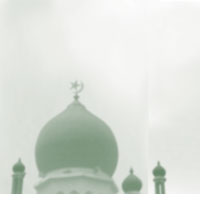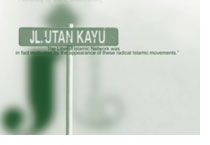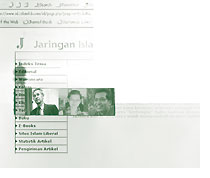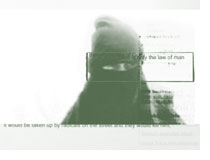 In
1997, Nong Darol Mahmada became furious with God. Her mother-who had been active in
organizing Islamic prayer meetings in her neighborhood in Labuan, Banten, West Java-was
struck with an incurable illness that would leave her crippled for life. Nong thought that
God had abandoned them. "My mother was a good person and a devoted wife. Why would
God let her suffer? When she became ill, everything fell apart." At Nong's father's pesantren
religious school, the enrollment dropped from around 500 to 100. "My mother used to
take care of everything," Nong says. "No one could replace her. I thought, why
doesn't God see that by making my mother sick He was losing so many people who had praised
Him?' I was very angry."
In
1997, Nong Darol Mahmada became furious with God. Her mother-who had been active in
organizing Islamic prayer meetings in her neighborhood in Labuan, Banten, West Java-was
struck with an incurable illness that would leave her crippled for life. Nong thought that
God had abandoned them. "My mother was a good person and a devoted wife. Why would
God let her suffer? When she became ill, everything fell apart." At Nong's father's pesantren
religious school, the enrollment dropped from around 500 to 100. "My mother used to
take care of everything," Nong says. "No one could replace her. I thought, why
doesn't God see that by making my mother sick He was losing so many people who had praised
Him?' I was very angry."
Nong's relationship with God has been a
passionate affair. As a young woman, she desired only to devote herself to religion. As a
middle-school student at her father's pesantren, she dreamed of leaving
the school to live alone in a rented room where she could spend more time in solitary
praise of God. Nong found her inspiration in Rabi'ah al-Adawiyah, an 8th century woman
Sufi from the area that is now Iraq, who was well-known for her concept of divine love.
"Rabi'ah didn't marry, she spent all her time performing wirid," says
Nong, referring to the practice of reciting the Qur'an to praise God, usually done after
completing the five daily prayers or h.
Nong lost interest in school, preferring to
spend her time reciting the Qur'an and praying. One night in the middle of her devotions,
she got up and left her room. She walked alone through the dark streets until she arrived
at the small prayer room (musholla) at the bus terminal. She prayed there alone
until dawn. That incident led her teacher to reprimand her, warning that a bus terminal
was a dangerous place for a young woman.
This was not Nong's first scolding. She had
grown up in a very strict religious environment under her paternal grandmother, since her
parents were busy running the religious school. Nong's grandmother believed in a literal
adherence to Islamic scripture. It was she who made sure that Nong wore a jilbab,
the scarf worn by many of Indonesia's Muslim women to cover the hair, neck and chest. Nong
remembers her grandmother warning her, "If you don't wear a jilbab and cover
your hair, when you die your hair will burn in the fires of hell." Once she watched
her grandmother yank the hair of her older sister, which had been fashionably curled and
styled in a ponytail. "Hey, you're going to hell! You'll be burned up!" her
grandmother shouted, pulling on her granddaughter's offending coiffure.
It was not until Nong entered university at the
Syarif Hidayatullah State Academy for Islamic Sciences (IAIN) in Jakarta that she was
introduced to interpretations of Islam that challenged her grand`mother's thinking.
Exposed to a new world of books and Qur'anic interpretations, she came across the works of
Fatima Mernissi, a Moroccan Muslim feminist.
"Fatima says that the jilbab
exists for the political self-interests of men," Nong says. "I became convinced
that the command to wear the veil was very political. I saw the revelation of the Qur'anic
verse about the veil to have been meant not as a requirement but as an appeal. It was
revealed during the time of the Prophet Muhammad, when people harassed Muslim women as a
way of attacking the Prophet. But now there is no difference if I wear jilbab or
not. It's a warning. The Prophet saw the clothing traditions of the Quraishi women at the
time, and he said, 'pull your coverings over your chests.' There was no command to cover
your hair. I wear modest clothes that don't attract people's attention-that's my jilbab."
On campus, Nong began to participate in
discussions with her new friends, and she felt that her previous understanding of Islam
had been backward. "All that I experienced in the pesantren made me restless
at university. It seemed that what I had understood to be true wasn't right. How, I asked
myself, could I have accepted those kinds of teachings? I felt really out of it."
Like Nong, Ulil Abshar-Abdalla was raised in an
orthodox Islamic tradition. His father was the head of a pesantren in Pati,
Central Java, and believed that formal schooling was syakkun fil Rab, a symptom
of doubt in God. Ulil's father was distressed to see his son reading books written in
Latin letters rather than the holy texts written in Arabic. For Ulil's father, true
knowledge was contained in these Arabic texts.
 But
Ulil was drawn to read widely, despite his father's warning that such books would lead him
astray. By the time he was of middle-school age, Ulil had read h (Upheaval in Islamic
Thinking), the journal of Ahmad Wahib, a young Indonesian Islamic intellectual writing in
the 1970s and who died at a young age. Wahib introduced Ulil to the notion of freedom of
thought, not yet a popular concept among Indonesian Islamic thinkers. In the introduction
to his journal, Wahib wrote, "I believe in God, but God is not a land forbidden to
thought. God exists not in order for his existence to be un-thought. God takes shape not
in order to hide from the light of critique." Wahib believed that God was living,
fresh and flexible: "He does not want to be fixed in place."
But
Ulil was drawn to read widely, despite his father's warning that such books would lead him
astray. By the time he was of middle-school age, Ulil had read h (Upheaval in Islamic
Thinking), the journal of Ahmad Wahib, a young Indonesian Islamic intellectual writing in
the 1970s and who died at a young age. Wahib introduced Ulil to the notion of freedom of
thought, not yet a popular concept among Indonesian Islamic thinkers. In the introduction
to his journal, Wahib wrote, "I believe in God, but God is not a land forbidden to
thought. God exists not in order for his existence to be un-thought. God takes shape not
in order to hide from the light of critique." Wahib believed that God was living,
fresh and flexible: "He does not want to be fixed in place."
Wahib's writings fuelled Ulil's search for new
thought. Ulil also found a teacher to offer him encouragement. He says, "Kyai Sahal
[Mahfudz] introduced me not only to modern Arab thinkers but also to the thought of Cak
Nur [Nurcholish Madjid, a progressive Indonesian Muslim thinker] and Gus Dur [Abdurrahman
Wahid, a leader of Nahdlatul Ulama, the largest Muslim organization in Southeast Asia and
former president of Indonesia]. It gave me a sense of pride in Islamic thought. He also
introduced me to Western philosophy. Many kinds of books were available in his school
library back then." (Sahal Mahfudz is now the head of the Majelis Ulama Indonesia, an
organization of Indonesian Islamic intellectuals.)
Books, however, were not enough to give Ulil a
clear path. He also sought a social environment that could provide an answer to his
restless questioning. "I entered the fundamentalist milieu and became a member of
their religious community. For two years I was one of them."
The fundamentalist outlook inspired Ulil to
even greater devotion. Previously he had followed Islam simply as a social tradition; now
he grew to see Islam as not just a set of religious rules but as a compass to guide
society and state. He remembers thinking at the time, "This is amazing."
But Ulil's perspective changed again after
listening to a lecture by a young Islamic intellectual, Imanuddin Abdurrahim, at the
Salman Mosque in Bandung. "[Imanuddin] had once been jailed by Suharto's New Order
government. I listened to him speak and I read his books, and it was very inspiring. His
background was in physics and he had a very logical way of thinking. He said that the law
of God is natural law, having an objective quality, and that it does not discriminate
between one group or another."
 Imanuddin
gave an example that stuck in Ulil's mind. "There are two buildings, one a mosque and
the other an office," Ulil recounts. "The office installs a lightning rod, but
the mosque does not. When a storm comes, the mosque will be hit by lightning, even though
it is a place for the worship of God. Because it does not follow the [natural] law of God,
it will face the consequences. This means that if Muslims want to progress, they cannot
depend only on religious texts that were produced in a certain social and historical
context, as if they were God's law, without considering how social laws have developed.
Social law is not static. The mistake of the fundamentalists is to see it as static."
Imanuddin
gave an example that stuck in Ulil's mind. "There are two buildings, one a mosque and
the other an office," Ulil recounts. "The office installs a lightning rod, but
the mosque does not. When a storm comes, the mosque will be hit by lightning, even though
it is a place for the worship of God. Because it does not follow the [natural] law of God,
it will face the consequences. This means that if Muslims want to progress, they cannot
depend only on religious texts that were produced in a certain social and historical
context, as if they were God's law, without considering how social laws have developed.
Social law is not static. The mistake of the fundamentalists is to see it as static."
Ulil came to see fundamentalism as archaic. He
became more deeply convinced of this in the midst of political shifts following the fall
of Suharto in 1998. Radical Islamic movements, such as the Islamic Defenders' Front (FPI)
and Laskar Jihad, injected religious emotion into political conflicts that had been
brewing across the nation during Suharto's thirty-three-year regime-often they advocated
violence as a moral response. In areas such as Ambon and Poso in eastern Indonesia, the
issues at stake became colored as an inter-religious war. In Javanese cities, vigilante
squads of the FPI attacked cafés and discotheques, claiming that they were protecting the
public from sin. There were raids and "sweepings" in boarding houses in Central
Java, enforcing curfews in the name of preventing immoral acts.
"This fundamentalism comes from a sense of
desperation, a feeling of disappointment," says Ulil. "They're disappointed
because Muslims once knew a golden age and now they feel degraded. They are experiencing
political fragmentation, they are being left behind in science and economics. Looking at
American policy in Palestine, they become spectators of injustice. 'Has God left us out?'
That's their fundamental question. They feel belittled. Fundamentalism gives them a sense
of pride. The real challenge, though, is regain their pride by confronting the roots of
the backwardness in certain fields, not to withdraw into a conservative group."
Nong interjects, "Fundamentalist Muslims
are unproductive, exclusive and they don't follow the developments of the times. As Ulil
says, religion is a living organism that makes us feel enthusiasm. If we feel enthusiasm,
then what Nietzsche said, 'religion is already dead,' that couldn't possibly happen."
Hamid Basyaib adds, "These days people
just react to situations, which at the level of discourse are dominated by aggressive
Islam or uneducated Islam," adds Hamid Basyaib. "These movements aren't
terrifying, but they do promote rigidity, backwardness and literalist thinking."
In 1999, Ulil, who graduated from the Institute
for Islamic and Arabic Knowledge in Jakarta, met with a number of friends, including
Goenawan Mohamad, Luthfi Assyaukanie, Ihsan Ali Fawzi, Nong Darol Mahmada, Ahmad Sahal and
Hamid Basyaib, all of whom shared many of Ulil's views and his determination to address
Indonesia's growing fundamentalism. Ulil says, "We've seen radical Islam grow
militant, systematic and organized, while liberal Islam has been unorganized,
weak-seeming, not militant, not resistant and unassertive in giving voice to its
perspectives. The Liberal Islamic Network was in fact motivated by the appearance of these
radical Islamic movements."
It's January 4, 2001 in Jakarta, and a meeting is underway in a wood-floored study with
dark blue walls, the office of Goenawan Mohamad, a columnist for the Indonesian
newsmagazine Tempo and one of the founders of the Jakarta-based Institute for the Study of
the Flow of Information (ISAI). The space is furnished simply with a table and six
black-varnished wooden chairs, and a long wooden bench covered in red pillows. The walls
are decorated with paintings and posters from European art exhibitions. An easel stands
near the door, holding drafting paper covered with pen strokes. The seven people in the
room have been engaged in serious discussion for hours.
Goenawan picks up a phone and calls Dahlan
Iskan, the Chief Editor of the Jawa Pos newspaper, to ask him for some space to
publish liberal Islamic thought. They have already agreed to appoint Nong Darol Mahmada to
work on a funding proposal, while Luthfi Assyaukanie will be in charge of planning and
managing a mailing list for discussing liberal Islam on the Internet.
"The Liberal Islamic Network was born in
that meeting," says Nong. "All we want is to provide a choice for interpreting
Islamic teachings."
"A lot of people don't realize that
reading the Qur'an cannot be value-free," Ulil adds.
"In other words, the Qur'an can be read
from different perspectives or angles. Each angle has its own validity. Even though each
of these angles is valid, that doesn't negate the possibility of mutual critique. Without
mutual critique, there's no possibility of us learning from each other."
These days, Islamic liberal thinkers take
inspiration from many sources, including the work of Charles Kurzman, whose book Liberal
Islam: A Sourcebook differentiates between those Islamic revival movements which
reject modernity and claim to be searching for the pure Islam practiced in the time of the
Prophet Muhammad, and liberal Islam, which supports a division between state and religion
in its search for a route to modernity. Ulil explains, however, that even within the
liberal Islamic community there are varying opinions about secularism. Some argue that an
attempt to separate politics and religion is impossible in today's world, or even that it
is an old-fashioned notion belonging to another era when secularism seemed much simpler.
In today's modern society, religion carries with it a cultural identity, and despite
attempts to marginalize it, it returns in much more complex forms.
"This makes it difficult to find the point
at which liberal Islam diverges from literal Islam-that's our term for the fundamentalist
movements. On some matters our positions meet-about pornography, for example, because
pornography does damage ideals about the family, and our religion places a great emphasis
on the family. Just like the Christian conservative George Bush, their rhetoric is filled
with references to family values," Ulil says.
However, as Kurzman explains, a respect for the
rights of women and non-Muslims, freedom of thought, anti-theocracy and support for
democracy provide liberal Islam with a wide space in which to move.
Indonesia's Liberal Islamic Network spreads
their viewpoints not only by publishing newspaper articles and hosting mailing list
debates, but also by sponsoring radio talk shows and Friday bulletins, and they have plans
to launch their own magazine. Funds for their operations come from The Asia Foundation and
The Freedom Institute, a nonprofit organization headed by the Indonesian pro-democracy
figure Rizal Mallarangeng. The Liberal Islamic Network has found that of all these
channels for publicizing their thought, it is syndicated media that has been the most
effective to date.
Ulil says, "People's reactions to the articles we published in the Jawa Pos
were amazing. I didn't realize it until I visited local communities, especially in East
Java and Eastern Indonesia."
Not everyone, however, has had a positive
reaction to the Liberal Islamic Network. The most heated response came after Ulil
published an article in the Kompas newspaper entitled "Freshening Up Islamic
Understanding" (Menyegarkan Kembali Pemahaman Islam)on November 18, 2002.
At seven o'clock in the evening, several weeks
after the article appeared and two days before the Muslim holiday of Idul Fitri, Nong
received a call on her cell phone from Hamid Basyaib. Hamid was in Jakarta, but Nong had
already returned to her parents' home for the holidays.
"Nong, Ulil has had a death fatwa
issued against him. Look at Detikcom [a news website]. I've been trying to call
Ulil but I can't get through. His cell phone isn't ringing. Ulil has to hear this. You let
him know, okay, Nong? Try to call him."
"Okay, I'll contact him later," Nong
replied easily.
After talking to Hamid, Nong opened her laptop
and logged onto the Detikcom website. Sure enough, she found a news item saying
that a group of religious scholars called the Forum Ulama Umat Indonesia (FUUI)
in Bandung, West Java had issued a fatwa calling for Ulil's death. Trying not to
panic, Nong interrupted her father, who was busy watching television. "Father, a
death fatwa has been issued against Ulil. Did you have anything to do with
it?" Nong's father replied that he had known about the plans for the group of
religious scholars to meet, but that he didn't know anything about a fatwa
concerning Ulil. Her father assured her that the fatwa wasn't really serious.
 Meanwhile,
Ulil was in a car driving through Central Java on the road home for the holidays with his
wife and child when his cell phone rang with a message: "What about those religious
teachers in Bandung? How should it be followed up in Bandung?" Ulil did not
understand the message.
Meanwhile,
Ulil was in a car driving through Central Java on the road home for the holidays with his
wife and child when his cell phone rang with a message: "What about those religious
teachers in Bandung? How should it be followed up in Bandung?" Ulil did not
understand the message.
"What I imagined at the time was that it
wouldn't be the FUUI who would execute Ulil, but that it would be taken up by radicals on
the street and they would kill him," Nong remembers.
Ulil stood accused of insulting the Muslim
community and spreading enmity and hatred through society by way of his writings. But
Athian Ali Muhamad Dai, head of the FUUI, denied that his organization had issued such a fatwa
against Ulil. "We never issued a death fatwa especially about Ulil in our
press release. We only called upon the state apparatus to dissolve that network, then we
noted that whoever insulted Islam could reasonably expect the death penalty." Athian
stated that he had already turned over Ulil's case to the police, complaining that what
Ulil wrote in his article was an evil act against religion. Athian says he had reported
Ulil to the police based on complaints from the Muslim community in Bandung. "Around
700 people complained. We distributed a questionnaire for this purpose-this was also what
the police wanted, proof of how much influence this act had on society. Some people who
were so fed up that they wanted to see Ulil hang."
For his own part, Athian considered Ulil's
thinking dangerous for, he argued, it positioned the human mind above God. "It's a
perfect example of insulting Islam," he said. "Ulil dares to say there is no law
of God, there is only the law of man. He calls the Islamic punishment of stoning to death
and other matters things that 'not meaningful'." Athian claimed that he would not
forbid Ulil from having an alternative interpretation of Islam as long as he did not
spread his ideas by writing in the mass media. "If Ulil wants to scream and shout in
his room or with his own group, that's not a problem. If Ulil wants to say he has no
religion at all, that's not a problem. But don't say those things while claiming to be a
Muslim."
Fauzan Al-Ashari from the Majelis Mujahidin
Indonesia-a fundamentalist organization that counts among its members Abu Bakar Baasyir,
the man accused of complicity in several terrorist bomb blasts in Indonesia-said that he
disagreed with the plan to issue a fatwa against Ulil. "I heard about
that," he said, "but the fatwa doesn't exist. It's just a speculative
thing." Fauzan said he was, however, among those who supported the FUUI in its
attempts to have the police investigate Ulil. He suggested that the way out of the debate
was to muhabalah-to leave the decision in God's hands.
"For example," explained Fauzan over
the telephone, "we ask for a sign from Allah within three days, that one of us should
be struck by lightning and that's how we'll know which of us is wrong."
Kedai Tempo, an open-air Jakarta cafe, feels
relaxed this March 24th afternoon. It is near the Jaringan Islam Liberal offices, and Nong
and her friends like to meet here, drinking coffee or bottled tea, enjoying the breeze
that wafts in from the open sides of the café. But Nong Darol Mahmada's cell phone rings
often and she looks tired. She's organizing a campaign against the U.S. war on Iraq, a
campaign involving the Liberal Islamic Network and a number of well-known Indonesian
performers, including Iwan Fals, Franky Sahilatua and Trie Utami.
"When the Bali bombings occurred,"
Nong says, "I thought the fundamentalist groups would fade, because people would see
that they were wrong. But now the Iraq war becomes a new justification for the
fundamentalist attitude toward America or the West. Everything we've been working
for-democracy, freedom of thought-all seems in vain."
She turns to Ulil. "What are we going to
do now?"
"Well, you know, we'll just continue with
our agenda," he answers, already on his feet.
Linda Christanty is a
journalist and writer.
